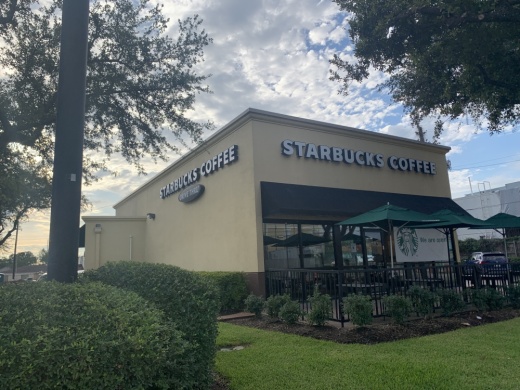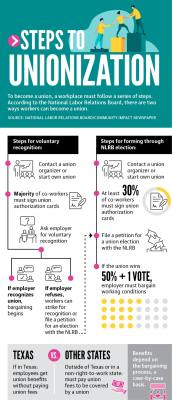Among the Houston businesses looking to become the next to unionize is a Starbucks store in Upper Kirby. After filing a petition to unionize in July, workers who are leading the charge said they anticipate sending out mail ballots in early September that will allow employees to vote on whether to support or oppose forming the union. Ballots are set to be counted Sept. 22.
“We hope we’re not only the first [Houston] store to win, but that we get a unanimous win,” said Josh DeLeon, the shift manager who filed the petition.
Because Texas is a right-to-work state, Hany Khalil said he believes workers are weaker and more divided with lower wages. Khalil is the executive director of the Texas Gulf Coast Area Labor Federation, a labor council that works to help other unions.
“Texas is on the lower end of the spectrum [for unions], which is the case in every right-to-work state,” Khalil said.
According to the Texas attorney general’s website, a right-to-work state means employment cannot be denied because of a membership or nonmembership in a labor union. It is illegal for an employer to require union affiliation and payment as a condition of employment.
However, employees can obtain the benefits of a union without being affiliated or paying the monthly dues.
In Houston, unions are seen in a variety of industries, but primarily the petrochemical and shipping industries because of the Port of Houston, which Khalil said is a historical base of the Texas labor movement. Workers in this area have organized since the 1930s, he said.
Unionization efforts have been taking place at various Starbucks locations around the U.S., said Michael Green, director of the Workplace Law Program at Texas A&M University. As of July, Austin and San Antonio both had two Starbucks that are unionized, while Denton has one. But, due to a number of factors, the push toward unionization could soon become more widespread, Green said.
“Now that you have companies that are so desperate to get workers, ... there’s a lot more attempts by the workers to engage in having some power and voice in the workplace through unions,” he said.
Leading the charge
The unionization effort at Starbucks, located at 2801 S. Shepherd Drive, Houston, follows a string of efforts across the U.S., starting with two Starbucks that unionized in Buffalo, New York, last December. As of early August, 229 Starbucks locations had voted to unionize with 208 of those being certified and ready to begin bargaining, according to the NLRB.
The push to unionize both locally and across the country has to do with securing stronger bargaining power, said DeLeon, who has been working at Starbucks for just under nine years.
“If each of us ... goes to management or upper management and makes an argument for a pay raise, it will likely not lead to much,” he said. “But if there’s a union that now represents all workers in the workspace, that is a much bigger bargaining effort with employers.”
The Montrose workers reached out to Starbucks Workers United—a collective group of Starbucks employees who are organizing workplaces into unions with the help of Workers United Upstate, a progressive labor organization—to help them begin the process and provide legal guidance.
The TGCALF is also supporting the Montrose location by offering general help and advice, Khalil said. He said if the workers stay united, they will prevail.
According to Khalil, other Starbucks locations in the city are paying close attention to this effort, so he said he believes others will follow suit if the Montrose location is successful. DeLeon said his contact with Starbucks Workers United has since fielded outreach from other Starbucks stores in the Houston area about potentially organizing.
“I feel like the whole process has opened up a lot of people’s eyes, especially people my age and younger who are maybe not familiar with the process [and] are starting to learn that there are resources,” he said.
In an emailed statement from Starbucks, a spokesperson said the company is “listening and learning from the partners” in these stores and across the country.
“We’ve been clear that we respect all our partners’ voices and their legal right to organize,” Starbucks said in a statement. “From the beginning, we’ve also been clear in our belief that we are better together as partners, without a union between us, and that conviction has not changed.”
Steps to unionization
There are a couple of ways workers of an establishment can begin the process for unionization: a voluntary recognition or an election with the NLRB. A voluntary recognition is where workers contact a union organizer or start their own with a majority of signatures for union authorization cards. The employer recognizes the establishment as a union, allowing for a bargaining process to begin.
When creating a union through an NLRB election, workers contact a union organizer or start their own union. However, 30% of co-workers must sign union authorization cards to file a petition for a union election with the NLRB. If a majority of employees vote to support the union in an election held later on, the union becomes recognized, and an employer must bargain in “good faith” regarding working conditions.
Labor and employment lawyer Eric Nelson said the employer has opportunities that can be perceived by workers as a “threat or unlawful intimidation and promises” under the current law.
After the authorization card is signed, an employer can require employees to attend a meeting in which an employer can express hostility or objections to the organizer, Nelson said. However, a union does not have access to workers for a meeting to counteract this.
Intimidation tactics will often cause workers to vote against becoming a union during the election process, causing a case to lose, Nelson said. Data from the NLRB elections shows one of the five companies that have hosted union representation elections in Houston since 2019 lost: Univar Solutions Inc., a global chemical and ingredients distributor.
“The current deficiency is the inability of the union to communicate why unionization would be a good thing for them,” Nelson said.
Green said it can be hard to predict whether any given unionization effort will succeed due to the wide range of factors involved, including the work climate, the industry and the size of the business. However, he said it will always come back to the question of how employees are being treated.
“Are there concerns that are not being addressed?” he said. “It could be safety, employee benefits [or] wage increases. If they are not being addressed, has that galvanized a majority of the workers?”
The future
The goals of the unionization effort at the Upper Kirby Starbucks include better compensation and a better work environment for employees with more support from a company level, DeLeon said.
Green pointed to a number of factors he said are leading to a renewed interest in unionization both in Houston and across the state. The coronavirus pandemic put a spotlight on so-called “essential workers” that made people realize their value, he said. There is also a generational element, which Green said could play a role in driving unionization for the foreseeable future.
“Generationally you see more people now who are ... driving workers issues,” he said. “Companies that might have older or stale thinking, ... they are not realizing or reading the room and understanding that this may be a new day.”
Shawn Arrajj contributed to this report.






